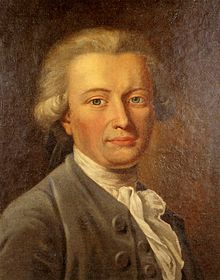Georg Forster
German naturalist, ethnologist, travel writer, journalist, and revolutionary (1754-1794)
Georg Forster (November 27, 1754 – January 10, 1794) was a German naturalist, ethnologist, travel writer, journalist and revolutionary.

| This article about an anthropologist is a stub. You can help out with Wikiquote by expanding it! |
A Voyage Round the World (1777)
edit- The degree of pleasure which may result from the perusal of a work, depends not only upon the variety of the subject, but likewise upon the purity and graces of style. We must resign all pretensions to taste and sentiment, if we did not prefer a well-told tale to a lame and tedious narration. Of late, however, the just esteem in which an elegant diction is held, has been so far abused, that authors, relying on the fluency of their language, have paid no attention to the matter which they proposed, but deceived the public with a dry and uninstructive performance.
- Preface
- It is very natural to overlook that which is near home, and as it were within our reach, especially when the mind looks forward, on discoveries which it reckons more important, in proportion as they are more remote.
- Book I, ch. I, Departure - Passage from Plymouth to Madeira - Description of that Island.
- When we saw the most beautiful fishes of the sea, the dolphin and bonito, in pursuit of the flying fish, and when these forsook their native element to seek for shelter in air, the application to human nature was obvious. What empire is not like a tumultuous ocean, where the great in all the magnificence and pomp of power, continually persecute and contrive the destruction of the defenceless? - Sometimes we saw this picture continued still farther, when the poor fugitives met with another set of enemies in the air, and became the prey of birds, by endeavouring to escape the jaws of fishes.
- Book I, ch. II, The Passage from Madeira to the Cape Verd Islands, and from thence to the Cape of Good Hope.
- [...] each vulgar opinion, proved to be erroneous, is an approximation to truth [...].
- Book I, ch. II, The Passage from Madeira to the Cape Verd Islands, and from thence to the Cape of Good Hope.
- It is the natural fault of young people to think too well of mankind [...].
- Book I, ch. II, The Passage from Madeira to the Cape Verd Islands, and from thence to the Cape of Good Hope.
- It is unhappy enough that the unavoidable consequence of all our voyages of discovery, has always been the loss of a number of innocent lives; but this heavy injury done to the little uncivilized communities which Europeans have visited, is trifling when compared to the irretrievable harm entailed upon them by corrupting their morals. If these evils were in some measure compensated by the introduction of some real benefit in these countries, or by the abolition of some other immoral customs among their inhabitants, we might at least comfort ourselves, that what they lost on one hand, they gained on the other; but I fear that hitherto our intercourse has been wholly disadvantageous to the nations of the South Seas; and that those communities have been the least injured, who have always kept aloof from us, and whose jealous disposition did not suffer our sailors to become too familiar among them, as if they had perceived in their countenances that levity of disposition, and that spirit of debauchery, with which they are generally reproached.
- Book I, ch. VI, Stay at the New Year's Islands. Discovery of lands to the southward. Return to the Cape of Good Hope.
- A man wholly destitute of philanthropy is a monster, justly detested by all mankind; but another, entirely incapable of anger, is a sheepish wretch, liable to be insulted by every mean-spirited villain.
- Book III, ch. II, Account of our stay at Tanna, and departure from the New Hebrides.
- Born to live our stated time on this globe, every one who puts a premature period to our existence here, offends the laws of the Creator. The passions are wisely implanted in our breast for our preservation; and revenge, in particular, guards us against the encroachments of others. Savages do not give up the right of retaliating injuries; but civilized societies confer on certain individuals the power and the duty to revenge their wrongs. Still, even in the most polished countries of Europe, this method of administring justice is not sufficient in all cases. Such is the imperfection of human institutions, that the public avenger of wrongs oft lifts his hand against the sacred rights of the whole community. On that occasion all civil agreements are dissolved, every man assumes his rights, and give free course to the passions. Even in private life there are occasions where this sacred principle of revenge is of infinite service in the best regulated community. Nothing is more common than oppressions, affronts, and injuries against which the law provides no remedy; nothing more frequent, than that a set men are powerful enough to wrest the laws to the disadvantage of the wretched and friendless. These instances would be still more numerous, and be carried to the most detestable pitch of tyranny, if this dread did not with-hold them, that the injured party may resume that power of redressing his wrongs, which he sees so inadequately exercised by his representative. He that attempts another's property, runs the risk of being killed without a trial by the person whom he robs; and the fear of the sword or the cane, hath often kept villains within bounds, who are invulnerable to the attacks of the law.
- Book III, ch. IV, Third and last stay at Queen Charlotte's Sound, in New Zeeland.